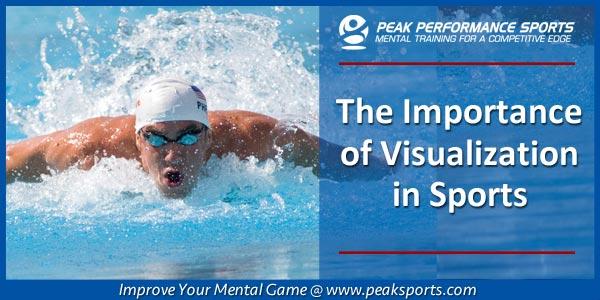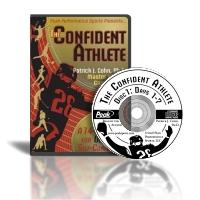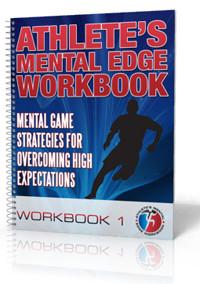
The Importance Of Visualization In Sports
Sports visualization is an experience… a training experience, a preparation experience and a warm-up experience. Visualization for athletes is a skill that you can improve and benefit from.
Whether you realize it or not, you visualize during sports or mentally rehearse naturally. Everyone thinks in pictures. Some athletes unintentionally have recurring images of missed opportunities, injuries, mistakes and losses.
There is one thing that separates elite athletes from average athletes… Elite athletes utilize the power of guided imagery or visualization. Imagery has long been a part of elite sports and many Olympic athletes have mastered the skill with the help of Sport Psychologists and Mental Game Coaches.
Guided visualization or imagery for athletes is consciously controlling the images or directing an athletic script in your head. One example of guided imagery that you having unknowingly used is when your coach was teaching you a new skill. You created an image in your mind of how the skill should look or the successful execution of the skill.
Guided visualization or imagery is purposely rehearsing a skill, routine or performance in your mind’s eye to program your body for success. However, sports visualization or mental imagery is more than just a visual experience. Many athletes prefer to feel movements and engage in the kinesthetic past of imagery.
Olympians and Visualization in Sports
As Olympic athletes gear up for 2016 Rio Olympic Games, many athletes are following the successful blueprints laid out by their 2014 winter Olympic counterparts who competed successfully in Sochi.
Canadian bobsledder Lyndon Rush credited imagery with helping him keep his head in the game throughout the long, arduous four years of training between the 2010 and 2014 Olympic Games.
RUSH: “I’ve tried to keep the track in my mind throughout the year. I’ll be in the shower or brushing my teeth. It just takes a minute, so I do the whole thing or sometimes just the corners that are more technical. You try to keep it fresh in your head, so when you do get there, you are not just starting at square one. It’s amazing how much you can do in your mind.”
Emily Cook, veteran American freestyle skier and three-time Olympian, described how her specific imagery scripts and mental rehearsal involving all the senses have helped her maintain longevity in her sport.
COOK: “Visualization, for me, doesn’t take in all the senses. You have to smell it. You have to hear it. You have to feel it, everything.”
COOK: “I would say into a [tape] recorder: ‘I’m standing on the top of the hill. I can feel the wind on the back of my neck. I can hear the crowd,’ kind of going through all those different senses and then actually going through what I wanted to do for the perfect jump. I turn down the in-run. I stand up. I engage my core. I look at the top of the jump. I was going through every little step of how I wanted that jump to turn out.”
Nicole Detling, a sports psychologist with the United States Olympic team explains the importance of having a multi-sensory approach when visualizing.
DETLING: “The more an athlete can image the entire package, the better it’s going to be.”
Michael Phelps and the 2016 Olympics
Michael Phelps is already the most decorated Olympian of all time with 22 medals to his name including 18 gold medals. The 2016 Rio Olympics will be Phelps’ fifth Olympic Games and, once again, he is using the power of guided imagery to prepare for success.
Bob Bowman has been Phelps’ coach since he was a teenager and has included mental imagery or visualization as a part of Phelps’ mental training.
Bowman instructed Phelps to watch a “mental videotape” of his races every day before he went to sleep and when he woke up in the morning. Phelps would visualize every aspect of swimming a successful race starting from the blocks and culminating in a celebration after the race was won.
Bowman would instruct Phelps to “Put in the videotape” during training sessions to help motivate Phelps to push harder.
Bowman believes that mental imagery helped Phelps develop the habit of success.
BOWMAN: “We figured it [imagery] was best to concentrate on these tiny moments of success and build them into mental triggers… It’s more like his habits had taken over. The actual race was just another step in a pattern that started earlier that day and was nothing but victories. Winning became a natural extension.”
Why is visualization or mental imagery such a powerful tool for success?
When athletes visualize or imagine a successful competition, they actually stimulate the same brain regions as you do when you physically perform that same action.
Visualization in sports or mental imagery is a way of conditioning for your brain for successful outcomes. The more you mentally rehearse your performance, the more it becomes habituated in your mind.
Think of visualization in sports as a pregame walk-through. Many basketball teams and football teams conduct rehearsals or walk-throughs the day before a big game to fortify their game strategy and become familiar with what to expect during game situations.
Athletes who use visualization can eliminate some of the unknowns that create competitive anxiety. When athletes use visualization, they not only see the action unfold but truly feel the event take place in their mind’s eye.
Visualization for athletes is the tool great performers use to help them succeed and stay on top of their game mentally.
How to Use Sports Visualization For successful Performance:
- Visualize the outcome you want – When you mentally rehearse your performance in your head, make sure you see the event as how you want it to unfold. If your mental images turn negative, stop the mental tape, rewind and restart then visualize again see the performance you want to see.
- Use all your senses from a first-person perspective – Visualize your sports performance in detail. What would you see, hear, feel, smell and taste. Feel how your body would feel as you go through the motions of your performance. Try adding in some physical movements that coincide with the visualized images. Feel the excitement of successfully fulfilling your performance goal.
- Practice frequently – Mental rehearsal for athletes is a skill that becomes better with repetition. Practice your visualization or imagery daily.
- If you want to take advantage of the power of visualization, consult with a Mental Game Coach about incorporating this essential skill into your training.
Boost Your Self-Confidence With Mental Game Coaching!
Master mental game coach, Dr. Patrick Cohn, can help you or your athlete(s), ages 12 and up, overcome mental game issues with personal coaching.
You can work with Dr. Patrick Cohn himself in Orlando, Florida or via Skype, FaceTime, or telephone. Call us toll free at 888-742-7225 or contact us for more information about the different coaching programs we offer!
What are our students saying?
“Danielle did really well with controlling her emotions during the matches today. We were very proud of her for not showing her frustrations during the match; I think that was a big accomplishment. She really looked in control of her emotions even when she double faulted or made mistakes. The changes we saw on Danielle’s behavior in less than 24 hours were AWESOME! Thank you for your guidance!”
~Jennifer Alamo, Tennis Parent
For All Athletes – Learn Confidence-Boosting Techniques!
D you have a negative self-image of yourself as an athlete that stifles confidence?
No matter ow positive you try to be, are you unable to shake the doubt that rushes into your head when you size up your competition?
Have you labeled yourself as a loser, poor closer, or mediocre athlete and these labels keep you stuck in a rut of self-pity and indecision?
If you’ve answered yes to any of these questions, check out The Confident Athlete!
The Confident Athlete CD and workbook program is a 14-day plan for ultimate self-confidence. This program is ideal for any athlete or coach that wants to discover proven confidence-boosting techniques guaranteed to drastically build self-confidence and improve sports performance.
Learn more about one of our most popular CD programs in The Confident Athlete Series…
The Confident Athlete: A 14-Day Plan For Ultimate Self-Confidence
Check out all of the products in The Confident Athlete Series!
What are customers saying?
“We are amazed at how much ‘The Confident Athlete’ program has helped my niece play her best tennis during matches. She literally made it to the farthest round of a tournament (semifinals) after finishing the CDs/workbook. We are going to do all 3 in the series.”
~Jason Bourguignon, Uncle
“I am a ASP world qualifying professional surfer and after beginning the ‘The Confident Athlete’ I had an almost instant change in attitude about my own surfing ability and my mindset going into competition. By using the Confident Athlete strategies, my confidence has done a complete 180 degrees. I won a local pro/am a few weeks back, and just had my best result of the year in one the last big events on the world circuit this last week in Brazil! It is my secret weapon!”
~Shaun Burrell, Professional Surfer (Listen to his success story)
For Young Athletes and Parents – Learn More About How to Help Kids Improve Confidence Quickly!
We’ve got a great program for you called “The Confident Sports Kid: A 7-Day Plan for Building Ultimate Self-Confidence.”
The Confident Sports Kid is a 7-day program for sports parents and kids to boost young athlete’s performance, happiness and success… in sports and life!
The Confident Sports Kid is two programs in one. There’s a manual and CD for parents/coaches, and a workbook/CD for young athletes.
Packed with mental strategies that you and your kids can start using immediately, this program teaches your athletes how to identify confidence busters, proactively deal with them, manage expectations that undermine confidence, and mentally prepare to stay confident when faced with adversity.
What’s more, our program teaches you, as sports parents and coaches, how you may be hurting your kids’ confidence and gives you instructions for changing your behavior in ways that will improve your athletes’ performance, confidence and enjoyment.
Learn more about one of our most popular CD programs in The Confident Sports Kid Series…
The Confident Sports Kid: A 7-Day Plan for Building Ultimate Self-Confidence
Check out all of our products in The Confident Sports Kid Series!
What are parents and coaches saying about our program?
“Dr. Patrick Cohn and Lisa Cohn are to be congratulated! Together, they offer a wealth of knowledge, information, and practical mental tools for sports parents on the substantial “mental game” challenges and pressures facing today’s young athletes.”
~Marc D. Anderson, LCSW, MGCP, Mental Game Coach
“Dr. Patrick Cohn and Lisa Cohn are to be congratulated! Together, they offer a wealth of knowledge, information, and practical mental tools for sports parents on the substantial “mental game” challenges and pressures facing today’s young athletes.”
~Marc D. Anderson, LCSW, MGCP, Mental Game Coach
 For Mental Coaches – Add More Value To Your Mental Training Programs!
For Mental Coaches – Add More Value To Your Mental Training Programs!
This workbook series was designed for coaches and mental coaches to use with their athletes.
The Athlete’s Mental Edge workbooks complement your existing mental training program. Each of the 15 workbooks in the Athlete’s Mental Edge System teaches your athletes a specific mental skill to improve their performance.
For mental coaches, this system is ideal for between session education.
For sports coaches, you’ll be able to conduct 15 team seminars using the workbook system.
In the Athlete’s Mental Edge workbook system, you receive 15 easy-to-read, practical Mental Edge Workbooks on PDF, as well as 16 coaches’ game plan MP3 audio files.
Athlete’s Mental Edge Workbook System
What are coaches saying?
“Congratulations on your Mental Edge workbooks. I have been through the package and it looks great! The MGCP program just got a lot better. Your workbook program makes it much more tangible and easier to use the mental strategies. This is the missing link in the MGCP program!”
~Bob Simpson, MGCP
“I’ll start by saying that the Mental Edge Workbook program is awesome. It put all the pieces together for my mental work with soccer players.”
~Eitan Azaria, Mental Coach for Soccer



